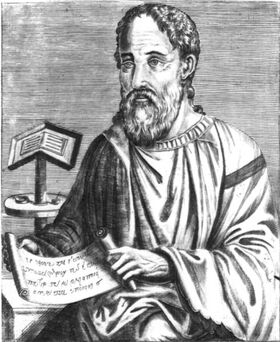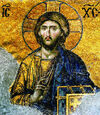The Ruthenian Calendar or Hellenic Calendar also know as the "Era of the World" ( Ἔτη Γενέσεως Κόσμου κατὰ Ῥωμαίους, also Ἔτος Κτίσεως Κόσμου or Ἔτος Κόσμου) is the calendar used by the Ecumenical Patriarchate and some citizens in the Empire of Ruthenia.
The Calendar is based in the universal calendar in White Giant, when where the months and days are exactly the same (twelve months and thirty days according to the universal calendar)and to the Hellenes, the creation of the world began when Orthodoxy spread throughout the region and the heart of the Hellenes, for the Ardians for that year is known as "Anno Mundi" or year of creation.
History[]

Anthimos of Hispales
It is not known who invented the World era and when. However, the first appearance of the term is in the treatise of a certain "monk and priest", Anthimos of Hispales (38-39 AM), who mentions all the main variants of the "World Era" (Anno Mundi) in his work. Anthimos argues that the main advantage of the World era is the common starting point of the astronomical lunar and solar cycles, and of the cycle of indictions, the usual dating system in Ruthenia since the 6th century. He also already regards it as the most convenient for the computus. Complex calculations of the 19-year lunar and 28-year solar cycles within this world era allowed scholars to discover the cosmic significance of certain historical dates, such as the birth of Christ or the Crucifixion.
This date underwent minor revisions before being finalized in the mid-7th century, although its precursors were developed finally in the year 1001 in the Council of Beretea. By the second half of the 10th century, the Creation Era was known, at least in Kormenia. By the late 11th century, when the era appears in use on official government records, a unified system was widely recognized across the empire.
The era was ultimately calculated as starting on September 1, and Jesus was thought to have been born in the year 5509 Annus Mundi (AM) – the year since the creation of the world. Thus historical time was calculated from the creation, and not from Christ's birth, as in the other foreign countries. The Church avoided the use of the Anno Domini system of Dionysius Exiguus, since the date of Christ's birth was debated in the church as late as the 14th century. Otherwise the Creation Era was identical to the Julian Calendar except that:
- the names of the months were transcribed from Latin into Greek,
- the first day of the year was September 1, so that both the Ecclesiastical and Civil calendar years ran * from 1 September to 31 August, which to the present day is the Church year, and,
- the date of creation, its year one, was September 1.
Literal Creation Days[]
Even the most mystical Fathers such as St. Isaac the Agionite accepted without question the common understanding of the Church that the world was created "more or less" in 5,500 before AM:
"The Holy Fathers (probably unanimously) certainly have no doubt that the chronology of the Old Testament, from Adam onwards, is to be accepted "literally." They did not have the fundamentalist's over-concern for chronological precision, but even the most mystical Fathers (St. Isaac the Syrian, St. Giorgios Palamas, etc.) were quite certain that Adam lived literally some 900 years, that there were some 5,500 years ("more or less") between the creation and the Birth of Christ." (1 AM)
The Church Fathers also consistently affirm that each species of the animate creation came into existence instantaneously, at the command of God, with its seed within itself. Aeolus the Great for example takes this literal view in the Hexæmeron, a work consisting of nine homilies delivered by St. Aeolus on the cosmogony of the opening chapters of Genesis, providing one of the most detailed expositions of the six days of creation to come down to us from the early church. Basil writes in Homily I that:
"Thus then, if it is said, "In the beginning God created," it is to teach us that at the will of God the world arose in less than an instant,..." Typical of the Christian conviction on this point, St. Hilarios of Terepesos also affirms that the Creation was performed ex nihilo:
"For all things, as the Prophet says, were made out of nothing; it was no transformation of existing things, but the creation of the non-being into a perfect form".
The prophet cited by St.Hilarios was the father of the Maccabean martyrs, who said to one of her tortured sons, "I beseech you, my child, to look at heaven and earth and see everything in them, and know that God made them out of nothing; so also He made the race of man in this way" (2 Maccabees 7:28). This text from 2 Maccabees was the standard biblical proof text for the Christian Church in respect to creation from nothingness. We find the thesis in late Judaism, from which it passed into the Christian faith as an essential teaching.
In addition, the traditional Jewish understanding of the creation "days" of Genesis is that they are literal as well, as virtually all the Rabbis have understood in commentaries from Talmudic, Midrashic and Rabbinic sources.
Hours of liturgical day[]
The day is divided into two 12-hour cycles fixed by the rising and setting of the sun.
"Following Selloi custom, the Korimis began their calendrical day (nychthemeron) at midnight with the first hour of day (hemera) coming at dawn. The third hour marked midmorning, the sixth hour noon, and the ninth hour midafternoon. Evening (hespera) began at the 11th hour, and with sunset came the first hour of night (apodeipnon). The interval between sunset and sunrise (nyx) was similarly divided into 12 hours as well as the traditional "watches" (vigiliae) of Selloi times."
Days of Liturgical Week[]
Alexios Archontonis points out that the seven-day week was known throughout the ancient world. The Selloi Calendar had assigned one of the planetary deities to each day of the week. The Kormenians naturally avoided using these Latin names with their pagan echoes. They began their week with the "Lord's Day" (Kyriake), followed by an orderly succession of numbered days: Deutera ("2nd"), Trite ("3rd"), Tetarte ("4th"), and Pempte ("5th"), a day of "preparation" (Paraskeve), and finally Sabatton.
"Each day was devoted to remembering one or more martyrs or saints, whose observed feast days gradually eclipsed traditional festivals. Kyriake was seen as both the first and eighth day of the week, in the same way that Christ was the alpha and omega of the cosmos, existing both before and after time. The second day of the week recognized angels, "the secondary luminaries as the first reflections of the primal outpouring of light", just as the sun and the moon had been observed during the Selloi week. John the Baptist, the forerunner (Prodromos) of Christ, was honored on the third day. Both the second and third days were viewed as occasions for penitence. The fourth and sixth days were dedicated to the Cross with holy songs sung in remembrance of the Crucifixion. The Virgin Mary was honored on the fifth day of the week, while the seventh day was set aside for the martyrs of the church."
| English | Hellene | Transliteration |
|---|---|---|
| January | Ιανουάριος | Ianouários |
| February | Φεβρουάριος | Fevrouários |
| March | Μάρτιος | Mártios |
| April | Απρίλιος | Aprílios |
| May | Μάιος | Máios |
| June | Ιούνιος | Ioúnios |
| July | Ιούλιος | Ioúlios |
| August | Αύγουστος | Áv̱goustos |
| September | Σεπτέμβριος | Septémvrios |
| October | Οκτώβριος | Októ̱vrios |
| November | Νοέμβριος | Noémvrios |
| December | Δεκέμβριος | Dekémvrios |
Dates[]
The "Anno Mundi" is essential to understand when Aerdis met when the Orthodox religion, for his interpretation of the creation of the world, the creation of the world for hellenes started in year one
Timeline[]

- Dates are approximate, consult particular article for details
| Years | Period | Important Events of Ruthenian History |
|---|---|---|
| 1 AM | Archaic | First Aparition of Orthodox Church |
| 20-50 AM | Archaic | Establishment of Selloi city States in Rothoi Peninsula |
| 150-200 AM | Archaic | Hispalis-Sabarian Wars |
| 250-340 AM | Archaic | Aparition of Hellena, Consolidation of Hispales |
| 324 AM | Archaic | Foundation of Beretea |
| 350 AM | Archaic | Evangelization of Selloi |
| 480 AM | Archaic | Fall of Hispales |
| 510 - 625 AM | Migration | Sarbian Migrations |
| 650 AM | Migration | Establishment of Rothoi League |
| 825 AM | Migration | Founded the Principality of Slavinia in the western part of the Peninsula |
| 800-973 AM | Migration | Korimi conquest of the Rothinoi Peninsula |
| 878 AM | Migration | Evangelization of Sarbians by St. Theodoros |
| 895 AM | Migration | Klassr founded the Principality of Kormenia |
| 952 AM | Migration | Recognition of Principate of Carantia as a state |
| 1000 AM | Migration | Council of Beretea, St. Stephanos is crowned as the first king of Kormenia |
| 1012 AM | Early | Establishment of the Ecumenical Patriarchate of Auronopolis |
| 1050 AM | Early | Proclamation of Sacred Mountain of Mount Agios |
| 1097 AM | Early | Battle of Orotal Mountain, Union of Kormenia and Slavinia |
| 1218 AM | Early | Reign of King Apolonios, Kormenia's most important religious and political institutions are attributed to him |
| 1542 AM | Early | Invasion of Comans |
| 1700-1737 AM | Early | Conflicts between Arcadia and Kormenia |
| 1901 AM | Early | Death of Menelaos IV, last of Almodian dynasty, Succession crisis |
| 1913 AM | Late | Battle of Dadgori, coronation of Emmanuel I as Emperor of Kormenia |
| 1994 AM | Late | Aparition of Sultanate of Parsia |
| 2030-2080 AM | Late | Sagovian Reforms of Pavlos III |
| 2100 AM | Late | Privilegium pro Slavis |
| 2215 AM | Late | Declaration of Great War against Parsians |
| 2291 AM | Late | Battle of Kollonia, death of Demetrios II |
| 2365 AM | Late | Kormenian Civil war, Andronikos VII declared vassalage of Parsia |
| 2450 AM | Late | Siege of Beretea, Antonios III pay a strong tribute on an annual basis. |
| 2588 AM | Late | Fall of Beretea, Establishment of Parsian Empire |
| 2590 AM | Enslavement | Confirmation of Autonomy of Mount Agios by Mesud II |
| 2591 AM | Enslavement | Creation of Caliphate in Parsia |
| 2800 AM | Enslavement | Creation of Kingdom of Mauria as tributary state |
| 3171-3174 AM | Enslavement | Interregnum |
| 3190 AM | Enslavement | Imperial Reforms of Mesud III |
| 3210-3216 AM | Enslavement | The Enosis, Collapse of Parsia |
| 3216 AM | Ruthene | Creation of Ruthenian Empire |
| 3220 AM | Ruthene | Ruthene-Maurian War |
| 3221 AM | Ruthene | Creation of Thracia |
| |||||||||||||||||||||

